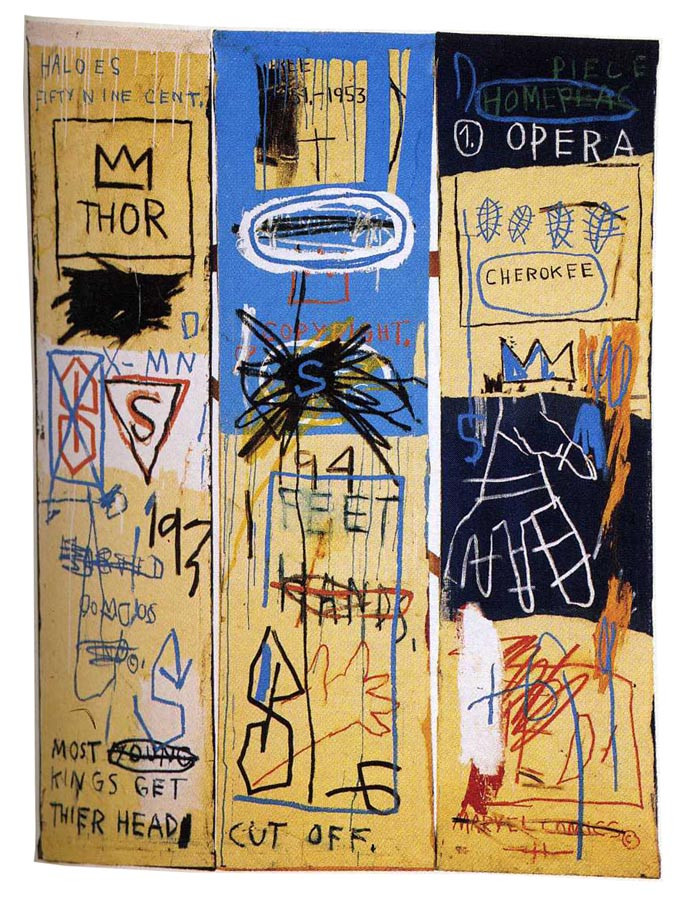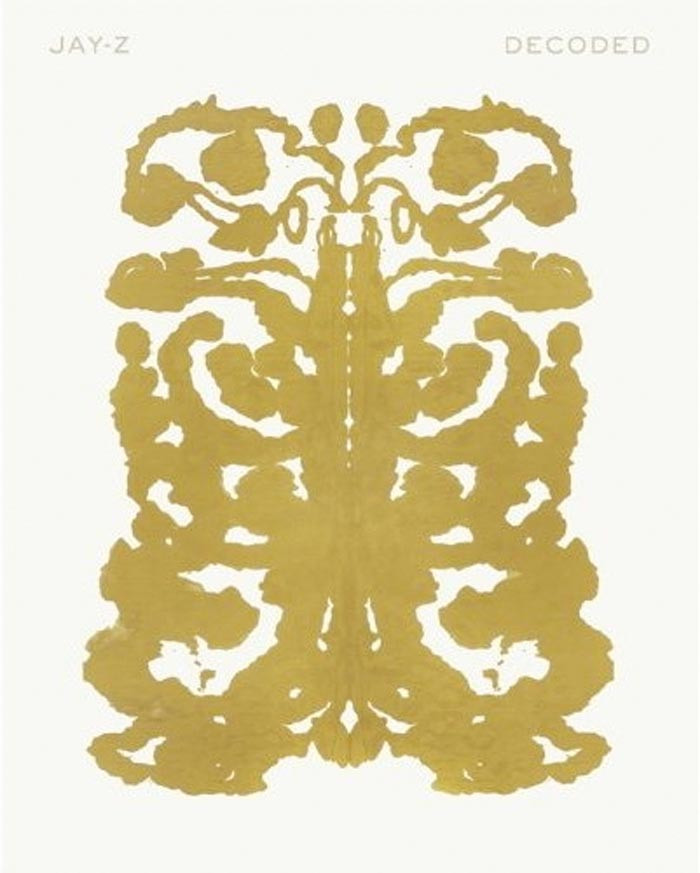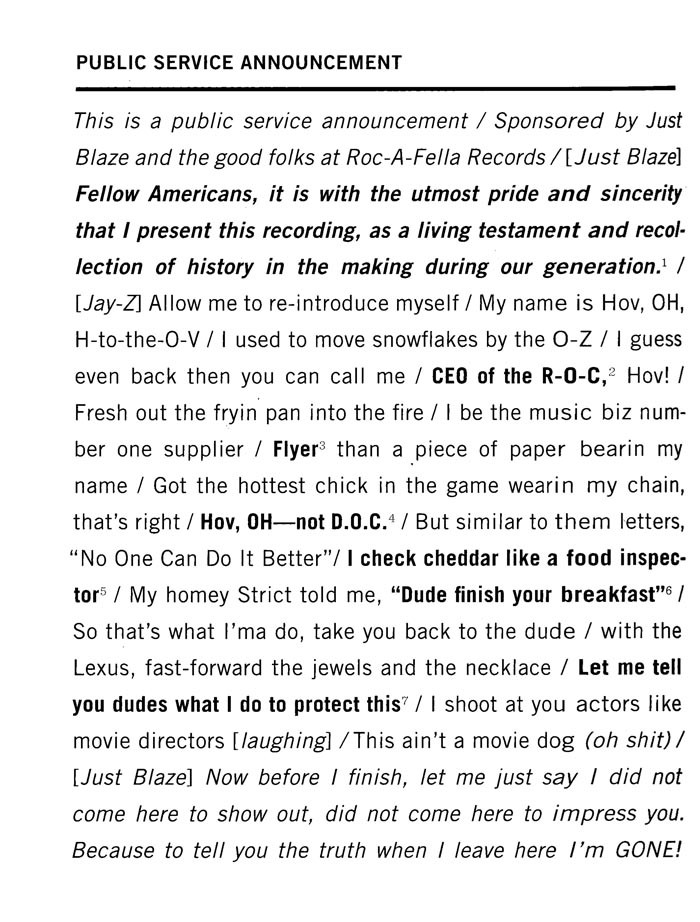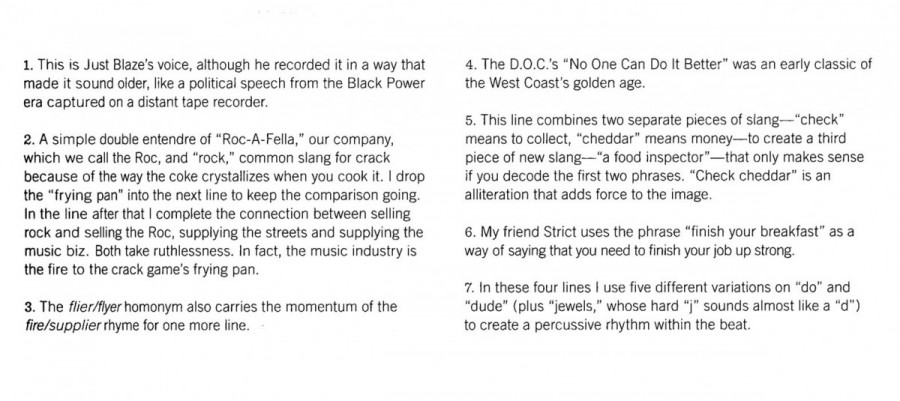Poetry Deciphered
Jay-Z’s New Tome Brings the Layperson Into Rap’s Inner Circle, Analyzes His Own Lyrics in Decoded
Rare is the person who hasn’t, by now, at least heard of Shawn Carter, alias Jay-Z, let alone downloaded a song or two to bump from their speaker system of choice, be it auto or iPod, when in need of a good aural pick-me-up.
Even if Jay was the biggest name in the rap biz five years ago or so, by now he’s a cultural icon that’s stepped out of the genre’s boundaries entirely. He’s a cuddly teddybear of a self-made multi-multimillionaire, married to everyone’s favourite R&B songstress. He’s been on a magazine cover with Warren Buffett. He’s been interviewed on Charlie Rose, for crying out loud. Your grandmother probably knows who he is by now.
All this to say that Jay might seem a bit of an odd person to feature in a Literary Arts section dedicated primarily to covering contemporary Canadian poetry & fiction of the, shall we say, underground variety.
And yet here he is with a career retrospective to match any artist’s greatest hits album—a book. And not just any book; a book whose supposed raison d’être is for Jay to explain his own lyrics. A New York Times bestselling tome of a black man who grew up in the projects, offering some critical exegesis on his poetry about his past as a drug dealer. It’s a strange animal.
Decoded is a brick of a thing, a coffee-table book’s coffee-table book. The hefty, solid feel of it extends, unfortunately, to the price tag; it’ll set you back 40 dollars if you’re so inclined, but on the flip side, the book is so layered and dense, so thick with detail and description—on top of being a serious visual delight—that it’s hard not to see the point. This is vintage Jay, as elegant as it is informative, a sort of Maybach of books.
The advance buzz on Decoded touted it as a chance for Jay to break down the lyrics of some of his favourite songs, to clue the listener in on his slang usage, his cultural references, his narratives of varying degrees of fictitiousness, and so forth. At this, Jay is a bit hit-or-miss.
Some of his explanations feel like they only merit inclusion in a much more detailed pass-through, and some feel frankly clarified to a degree that begins to seem overdone. Nevertheless, Jay shines a lot of light on a lot of interesting facts, both about his life and about his creative process. It’s strangely endearing to see a 40-something rap icon bragging about his lyrical skills not on a hot track, but in straightforward prose.
“I use ‘sense’ or ‘since’ six times in the preceding nine lines, alternating between them, a technical flourish that works as its own commentary.” Jay-Z, talking about “Moment of Clarity”
There’s an interesting selection of songs here—a lot of fan-favourites and a lot of chart toppers, but Jay balances them out with a not insignificant number of unreleased & rare tracks, as well as a few tracks by other artists he was featured on.
If you’re a Jay fan, chances are he left off at least half of your favourite songs, but his curveball choices are worth their inclusion just to see what he sees as his own songs most worth explaining. A track like “Minority Report,” for instance, which is about Hurricane Katrina, is a tiny blip on his back catalogue, but its presence allows him to spend time exploring his oft-overlooked political consciousness. As it happens, the book is only really 40 per cent about the lyrics; the remaining 60 per cent finds Jay waxing philosophical about race, class, art, history and his own life story.
That balance—a sort of bait and switch tactic wherein the hype about Decoded was all about the lyrics, but the meat of it is about Jay’s meditations on being black in America—is hardly new for the rapper, who famously claimed to have “dumbed down / to double [his] dollars” on 2003’s “Moment of Clarity,” and admits in Decoded to sprinkling his albums with dumb, poppy singles to boost sales while still delivering deeper, more thoughtful and more emotionally complex songs.
It’s a toss-up as to which aspect of the book is more interesting. Jay’s thoughts on the subjects he tackles are surprising in their lucidity, complexity, and insightfulness. The narrative voice he uses is a strange sort of hybrid tone that blends a scholarly diction with a willingness to use the slang that pervades his lyrics.
One of the issues facing books written by celebrities always seems to be whether the book would stand on its own merits; would it, if written by a nobody, still be worth reading?
In this case, it’s hard to say no; while the book has its drawbacks—the steep price, the at times iffy quality of the lyrical explanations—it remains a compelling document, and the very fact that a book that sets out to discuss things like alliteration, internal rhyme schemes, percussive rhythms suggests that, with a better P.R. department working for it, poetry can still be a subject the masses will slap down their hard-earned cash for.
This article originally appeared in Volume 31, Issue 24, published March 7, 2011.






